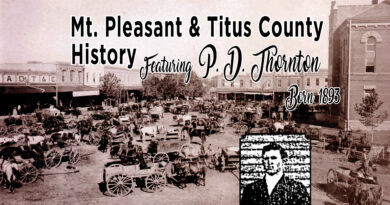Industry-leading truckers turn challenge to opportunity
GILMER, TEXAS – The dealer who’d contracted to deliver 90 new trucks last year called for a lunch meeting to explain why the contracted delivery date and prices were being cancelled, part of the picture Custom Commodities CEO David Lee Stevenson painted at a meeting of the management team of Custom Commodities, a first generation trucking company among the nation’s elite.

“I could always spot his trucks because they’re the cleanest on the road,” remembers Camp County Judge A.J. Mason, a former DPS trooper.
It’s intentional. Everything sits on chrome wheels.
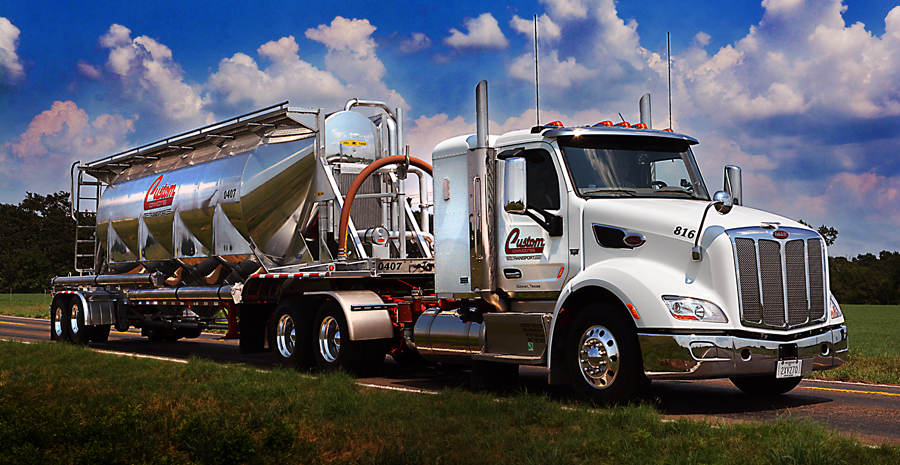
It’s unique, a management system turned upside down.
“Our drivers are our most important customers,” David Lee reminded admin and managers from nine terminals across the U.S. called in for an after-hours dinner meeting in Gilmer. As measured in dollars, efficiency can be directly related to retention and development of top drivers making $90,000 to $110,000.
It’s an extraordinary moment; add the industry-wide truck shortage to soaring fuel prices, a national shortage of drivers and a resulting increase in demand allowing the best in the business to cherry pick accounts. The best in the business are the ones positioned to create opportunity from challenges.
Custom Commodities is ahead of the curve.
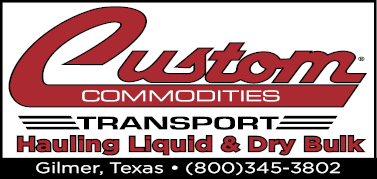
The higher fuel costs go, the more attractive rail shipping rather than trucking becomes.
Here’s a coffee shop formula: if it cost a dollar to ship it on a truck it costs fifty cents to put it on a train and a dime on a boat.
The company’s newest terminal is a transloading facility where rail merges with ships on the gulf coast accommodating any sequence of transfers among trucks and trains and boats, a snapshot of a company future spelled out at the manager’s meeting by David Anthony Stevenson.
(There’s David L and there’s David A, father and son.)
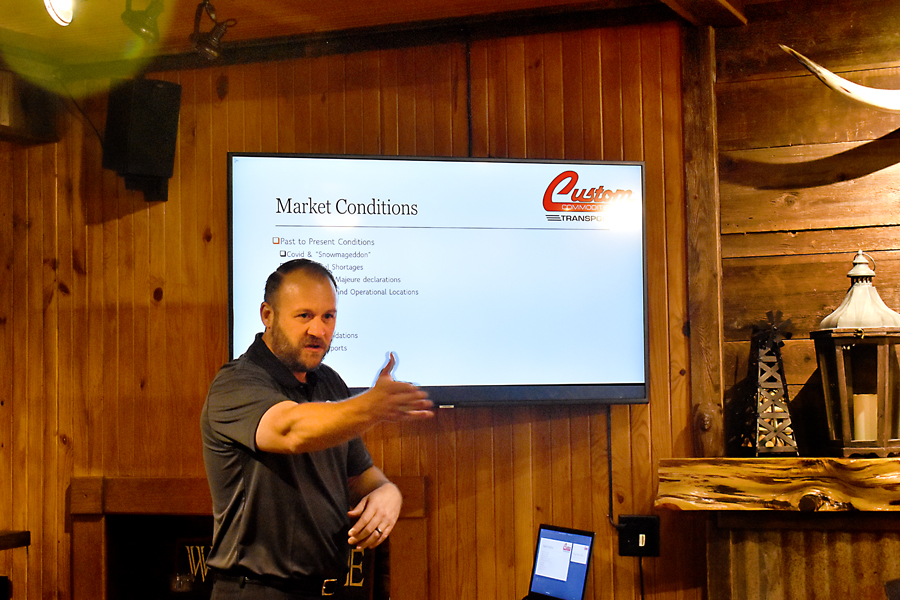
The Gilmer meeting, as revealed in a series of manager presentations, was a reflection of an inclusive policy rooted in a free-flow of information along with clarity concerning business strategies.
Going back years, the company has cut shipping costs for customers with train to truck “intermodal” facilities opening first at Sulphur Springs and then in Longview.
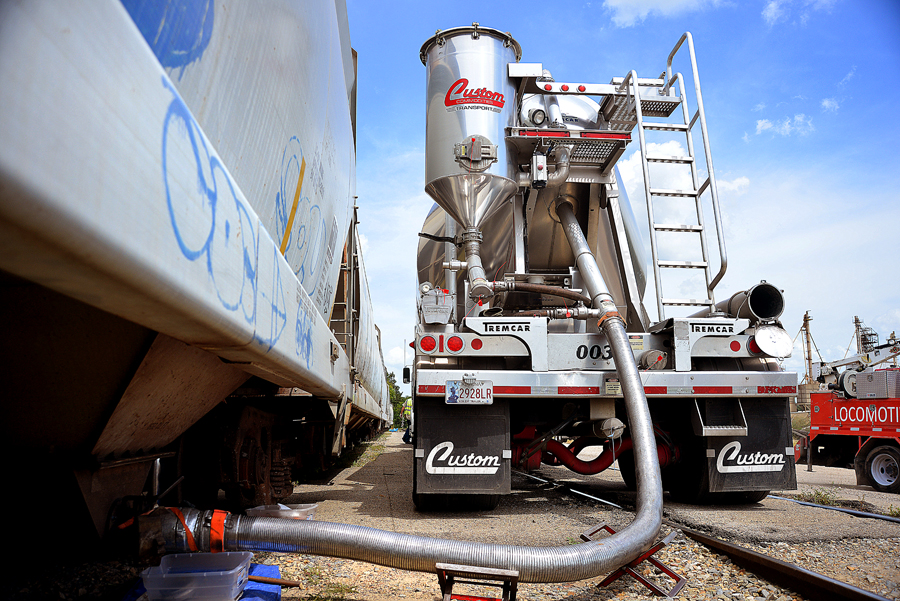
The new facilities on the coast represent an emerging operation presented to shippers as The Final Mile and turning trucking on its head to give company customers a cost advantage. Focusing on long hauling, the longer a client can keep product on a ship or a train, the less the cost. Facilitating transfers puts the company trucking operations in the driver’s seat to close the connection.
It’s been a numbers driven business since 1984 when David L figured a way to present his dad with an irrefutable case for buying Gilmer Seed and Feed’s first over-the-road truck. He was still riding a bicycle when riding in the feed store fertilizer distributor truck cranked his trucking dream.
His father, Bill, was a Navy pilot. After World War II he went to the Shell Oil Refining lab in Houston where he met his future wife, the sales manager for an oil rig company.

“Neither of them wanted to live in Houston,” Mr. Stevenson said. Back up Bill’s mother’s line, there was a family connection to John Brogotti, founder of the feed store. It brought the family back to Gilmer. During Bill’s time, it turned to fertile ground for his son’s trucking plan.
David Lee put numbers on paper, a plan based on buying a used cabover Peterbilt he could drive to the feed mill in Ada, Oklahoma. The sales hook was cutting cost for Gilmer Seed and Feed, the anchor account for the trucking operation that put him behind the wheel.
For two years he was the driver, salesman and office administrator. Five nights a week he pulled out at 5 p.m. for the 201-mile run to load up at the Evergreen Feed Mill in Ada.
Sometime not long after midnight, he’d back up to the dock at Leslie’s Feed and Supply in Daingerfield, stretch out and nap in the sleeper until opening when he’d break out the dolly, unload and stack the feed before turning toward Jerry Rosewell’s store in Omaha.
Nightly routes took him to Jacksonville, Marshall, Winnsboro and Henderson. When he landed a corporate contract with Morton Salt, he began brokering feed ingredients and named his line Custom Commodities.
Thirty six years later, over ribeyes at the first-in-company-history gathering of the core management team from across America, former Buckeye Linebacker Casey Driggers was among the first at the lectern. Hometown fingerprints are all over this company.
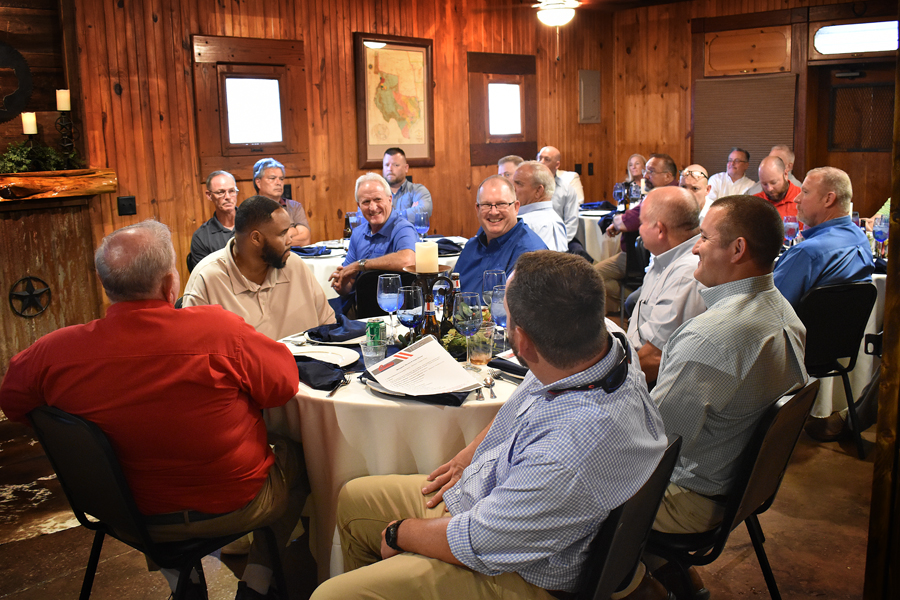
Mr. Driggers was a Gilmer police officer before coming aboard as the safety director five years ago. The company’s newest investment in safety is a training simulator designed by the same company that makes training simulators for airlines and space flight.
Trucks communicate with dispatch. A shift in force – hard braking, for example – triggers a message and creates a file saving video recordings from dual facing and side cameras. Every incident is reviewed. If there’s driver error, there’s time in the simulator that runs 180 programmed scenarios or any combination of custom-created scenarios.

Beyond the human safety factor, last year the company re-negotiated savings in insurance rates based on federally-required driver safety reports.
A new “intelligent” wheel hub that monitors tire pressure put Custom Commodities in a trade periodical feature story in “Bulk Transporter.”
Like the hard braking example, the system delivers an alert to dispatch if any of 18 wheels on 300 trucks operating anywhere in 48 states or Canada loses pressure.
“What we’ve found is that the system typically knows before the driver if he’s got a low tire,” Mr. Driggers said. It knows which tire. It knows where the truck is. It alerts the nearest terminal so that a repair truck can be dispatched. In initial incidents, it’s cut tire-related downtime by more than half.
While its procedures and policies provide for measuring the success or failure of operations, the company’s stated mission to be the leader setting industry bench marks comes down to human performance.

“The deal isn’t as important as the people in the deal,” said Mr. Stevenson, whose personal code was influenced by John Brogotti, who began Gilmer Seed and Feed. Mr. Stevenson grew up in the store.
“I loved spending time with him,” Mr. Stevenson said. “He was my Pappy.”
Locally, a handful of old timers remember Mr. Brogotti as a leader in the Gilmer business community that in 1935 created the Gilmer Yamboree as a showcase for sweet potato farmers. It’s now a week long Americana homecoming, a festival annually packing the business district.
His influence on a young David Stevenson today permeates corporate culture at Custom Commodities.
John Brogotti may be the only man in history to expect personnel in his feed store to read and abide by the human relations principles of Dale Carnegie’s “How to Win Friends and Influence People.”
Human relations matter.
“My goal is having direct contact with three of our drivers every day,” Mr. Stevenson said.
As defined by Pappy, principles were a simple matter – the Rotary Club 4-way test requiring truth put into action in ways always building and never tearing down define proper deportment.
“If you go in David Lee’s office, you’ll notice it’s posted on the wall,” Mr. Driggers said.




